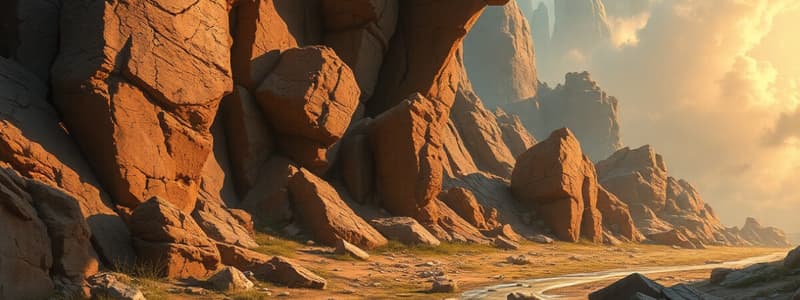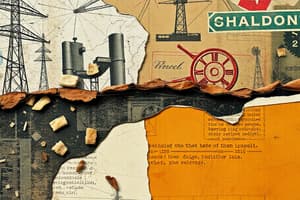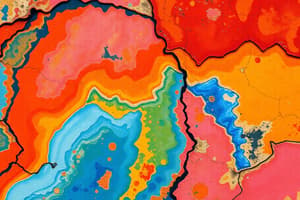Podcast
Questions and Answers
What type of weathering occurs when carbonic acid reacts with minerals in limestone?
What type of weathering occurs when carbonic acid reacts with minerals in limestone?
- Physical weathering
- Chemical weathering (correct)
- Mechanical weathering
- Biological weathering
Which of the following gases contributes to the formation of acid precipitation?
Which of the following gases contributes to the formation of acid precipitation?
- Carbon dioxide (correct)
- Oxygen
- Hydrogen
- Argon
How does acid precipitation affect forests?
How does acid precipitation affect forests?
- It makes them more resilient to diseases.
- It increases their growth rate.
- It has no impact on forests.
- It makes them more vulnerable to diseases. (correct)
What is the primary factor that influences the rate of weathering in a region?
What is the primary factor that influences the rate of weathering in a region?
Which climate is associated with the fastest rates of chemical weathering?
Which climate is associated with the fastest rates of chemical weathering?
What can accelerate the weathering process in Earth materials?
What can accelerate the weathering process in Earth materials?
Which type of acid is NOT typically associated with acid precipitation?
Which type of acid is NOT typically associated with acid precipitation?
What effect do human activities have on acid precipitation?
What effect do human activities have on acid precipitation?
What is the primary process involved in chemical weathering?
What is the primary process involved in chemical weathering?
Which factor significantly influences the rate of chemical weathering?
Which factor significantly influences the rate of chemical weathering?
How does water contribute to chemical weathering?
How does water contribute to chemical weathering?
What is oxidation in the context of chemical weathering?
What is oxidation in the context of chemical weathering?
What is carbonic acid and how is it formed?
What is carbonic acid and how is it formed?
What effect does slightly acidic precipitation have on rocks?
What effect does slightly acidic precipitation have on rocks?
Which of the following statements about chemical weathering is true?
Which of the following statements about chemical weathering is true?
What role does carbon dioxide play in chemical weathering?
What role does carbon dioxide play in chemical weathering?
What is mechanical weathering primarily characterized by?
What is mechanical weathering primarily characterized by?
Which variable significantly affects the rate of mechanical weathering?
Which variable significantly affects the rate of mechanical weathering?
Exfoliation is an example of which type of weathering process?
Exfoliation is an example of which type of weathering process?
How does ice contribute to mechanical weathering?
How does ice contribute to mechanical weathering?
What effect does pressure release have on bedrock formations?
What effect does pressure release have on bedrock formations?
What initiates frost wedging in rocks?
What initiates frost wedging in rocks?
Which of the following is NOT a process associated with mechanical weathering?
Which of the following is NOT a process associated with mechanical weathering?
What role do plant roots play in mechanical weathering?
What role do plant roots play in mechanical weathering?
What effect does a cool climate have on physical weathering compared to chemical weathering?
What effect does a cool climate have on physical weathering compared to chemical weathering?
How does rock type and composition influence weathering rates in a given climate?
How does rock type and composition influence weathering rates in a given climate?
What happens to surface area when mechanical weathering occurs?
What happens to surface area when mechanical weathering occurs?
What role does topography play in the rate of weathering?
What role does topography play in the rate of weathering?
Which process is defined as the removal of weathered rock and soil from its original location?
Which process is defined as the removal of weathered rock and soil from its original location?
Which of the following factors is least likely to influence the rate of physical weathering?
Which of the following factors is least likely to influence the rate of physical weathering?
Among the following agents, which one is NOT considered a contributor to erosion?
Among the following agents, which one is NOT considered a contributor to erosion?
Which condition is most likely to lead to faster chemical weathering?
Which condition is most likely to lead to faster chemical weathering?
What process occurs when rock and soil are dropped in a new location after being transported?
What process occurs when rock and soil are dropped in a new location after being transported?
How does gravity contribute to erosion?
How does gravity contribute to erosion?
What marks the transition from rill erosion to gully erosion?
What marks the transition from rill erosion to gully erosion?
What happens to a river’s current as it enters the ocean, affecting sediment transport?
What happens to a river’s current as it enters the ocean, affecting sediment transport?
What structures are formed as a result of sediment deposition at river mouths?
What structures are formed as a result of sediment deposition at river mouths?
What role do ocean currents, waves, and tides play in coastal erosion?
What role do ocean currents, waves, and tides play in coastal erosion?
Which type of erosion involves running water cutting small channels into the soil?
Which type of erosion involves running water cutting small channels into the soil?
What typically occurs when a river's current slows as it approaches the ocean?
What typically occurs when a river's current slows as it approaches the ocean?
Flashcards are hidden until you start studying
Study Notes
Mechanical Weathering
- Rocks and minerals break down into smaller pieces without changing composition.
- Frost Wedging: Water freezes in cracks, expands, and exerts pressure, widening the cracks.
- Plant and Tree Roots: As they grow and expand, roots wedged in cracks exert pressure, causing rocks to split.
- Removal of Overlying Rock: When pressure is reduced on bedrock, it expands, causing long, curved cracks to form.
- Exfoliation: Outer rock layers are stripped away, resulting in dome-shaped formations.
Chemical Weathering
- Rocks and minerals undergo changes in composition.
- Agents: Water, oxygen, carbon dioxide, and acid precipitation.
- Rock Composition: Determines the effects of chemical weathering.
- Temperature: Influences the rate of chemical reactions.
Effects of Chemical Weathering
- Water: Dissolves minerals and rocks, acts as a medium for chemical reactions.
- Oxygen: Reacts with substances in a process called oxidation, forming minerals with the oxidized form of iron (e.g., hematite).
- Carbon Dioxide: Forms carbonic acid when combined with water, dissolving rocks like limestone.
- Acid Precipitation: Sulfur dioxide, carbon dioxide, and nitrogen oxides released into the atmosphere form acids, causing acid precipitation.
Rate of Weathering
- Climate: Determined by the interaction of temperature and precipitation.
- Warm, Lush Areas: Fastest chemical weathering.
- Cool Climates: Physical weathering is more rapid due to slower chemical reactions.
- Rock Type and Composition: Determines the rate of weathering.
- Surface Area: Mechanical weathering increases surface area, promoting chemical weathering.
- Topography: Steep slopes promote erosion and expose more rocks to weathering.
Gravity’s Role
- Erosion: The removal of weathered rock and soil by agents like water, glaciers, wind, and ocean currents.
- Deposition: Erosion transports sediment and deposits it in another location.
- Gravitational Force: Pulls materials downslope, influencing many erosional agents.
Erosion by Water
- Stream Erosion: Reshapes landscapes, carving valleys and carrying away rock and soil.
- Rill Erosion: Running water cuts small channels into slopes.
- Gully Erosion: Rill erosion evolves into deeper, wider channels.
- River and Stream Deposition: Sediment is deposited near river mouths, forming deltas.
- Wave Action: Ocean currents, waves, and tides erode shorelines, creating cliffs and arches.
Studying That Suits You
Use AI to generate personalized quizzes and flashcards to suit your learning preferences.




